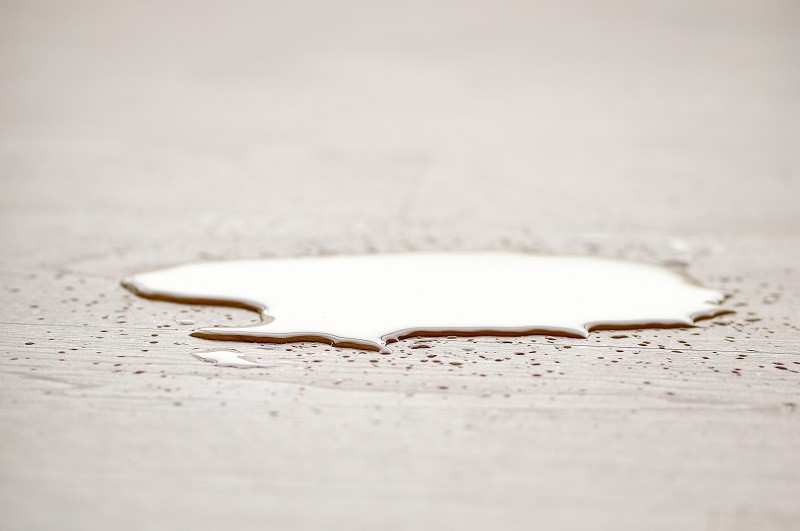How to Protect Your Flooring From Humidity Damage

The return of summer is a beautiful thing. Sunny days and warm weather are an invitation to get out and enjoy all summer has to offer. But some days, as we here in Indiana know all too well, those warm and sunny days aren’t necessarily too pleasant as the humidity begins to creep higher and higher. Humidity can put a damper (in a way literally) on even the most beautiful summer day and make us beg to get into some air conditioning.
People aren’t the only ones who disapprove of high humidity, however. If your home features beautiful hardwood floors, you ought to know that humidity is the mortal enemy of hardwood. Humidity damage to hardwood floors can be an all too common occurrence in homes if the proper precautions aren’t taken. When the proper protection isn’t taken, it can render even the most stunning hardwood flooring ruined and in need of replacement.
As we enter the dog days of summer, the humidity is only going to become more and more of an issue. So, in order to give your hardwood floors the best protection from humidity damage here is everything you need to know about what humidity does to your floors and how to avoid it.
The dangers of humidity
As beautiful, sophisticated, and luxurious as hardwood floors are in any home, hardwood does admittedly require a bit more care than other styles of flooring to maintain it and protect it. One of the things that hardwood flooring is most vulnerable to is water and moisture. This is the reason why humidity is so dangerous to hardwood.
Humidity is a reading of how much water vapor is present in the air. During the summer, as rainwater and nearby bodies of water warm, water vapor evaporates into the air. So that means the more humid it is in your house the more moisture is being exposed to your hardwood. When hardwood is exposed to moisture, its porous nature will naturally absorb it. When hardwood becomes engorged by water, that is where damage can begin to occur.
Too much moisture can cause hardwood to swell and expand. But due to the limited space it has available to do so, this causes hardwood to warp, cup, and buckle which pushes it out of place and causes irreversible damage. At this point, the plank or section of plank will need to be removed and replaced.
Not only that, but humidity can be a contributor to even worse floor damage: damage to your subfloor. Subfloor is the base your floors are laid upon and can become equally damaged by excessive moisture. If your subfloor becomes damaged it can become uneven, which will cause damage to the floor above and prevent proper installation further down the line.
So, as you can imagine, preventing your home’s humidity levels from getting too high is a high priority for hardwood owners who want to avoid costly repairs to their ruined floors.
How to protect your floors from humidity
Luckily, even on the most sweltering humid summer days controlling indoor humidity isn’t as challenging as it may seem. All you need to do is have an understanding of your control over your home’s humidity and you can impact it.
Control your home’s humidity levels
For the comfort of people, it is recommended that a home’s humidity is between 30-50%. For your floors, this level is also a good target to aim for. While people obviously don’t soak up water the way our hardwood floors will, you and your hardwood have a similar tolerance.
A good rule to live by is that if you are comfortable with the humidity levels in your home, chances are they are safe for your floors too. Once you start feeling too uncomfortable, that is when you are likely to have issues happen with your flooring.
Invest in a dehumidifier
One of the absolute best ways you can protect your home and hardwood flooring from humidity damage is to invest in a home dehumidifier. Dehumidifiers work by drawing in warm air containing the moisture, which is then passed by refrigerated coils inside that collects the condensation in the air. Now rid of excess moisture, the dry air is pumped back into your home.
There are single-room dehumidifiers available, but for complete protection of every single room, there are also whole-home dehumidifiers that integrate with your central heating and cooling system. The other plus side? Your floors aren’t the only ones that will benefit from the drier air!
The drawback, of course, is the initial investment. While you will enjoy more comfort and be better protected from hardwood flooring humidity damage, dehumidifiers can cost anywhere between several hundred to several thousand dollars. This can be a pretty steep investment, but on the other hand, so is replacing a large section of hardwood flooring…
Protect against humidity sources
There are, of course, other methods for controlling humidity in your home. Did you realize that the warm summer air isn’t the only place where humidity comes from? During the course of an average day, there are any number of things you do that adds excessive moisture to your home’s air and contribute to humidity levels. Limiting, or at least controlling these activities is another way to protect your hardwood floors.
Showering, doing the laundry, boiling water while cooking, and frequently opening and closing the doors and windows in your home are just some of the ways that you contribute to your home’s humidity levels. Thankfully, you have quite a bit of control over each of these factors.
A few tips for limiting sources of humidity in your home are to always make use of the exhaust fans in your bathroom whenever you take a hot shower or bath, as well as in the kitchen while you cook. When you wash your clothes, your dryer produces lots of humidity. When possible, you can drastically reduce the amount of humidity in your home by drying them on a clothes drying rack or outside the “old-fashioned way” on a clothesline.
Here at Tish Flooring, our process is built around an in-home visit in which we bring samples, take measurements, and help you with the decision-making process right from the comfort of your own home. Because our team gets a first-hand evaluation of your home, they can help you decide if hardwood, or perhaps a low-maintenance hardwood alternative like luxury vinyl plank (LVP), is right for you and give you tips on how to maintain it.
If you are ready to get started and find a range of hardwood flooring options, schedule your in-home appointment with Tish Flooring online or call 317-879-8474 today!

